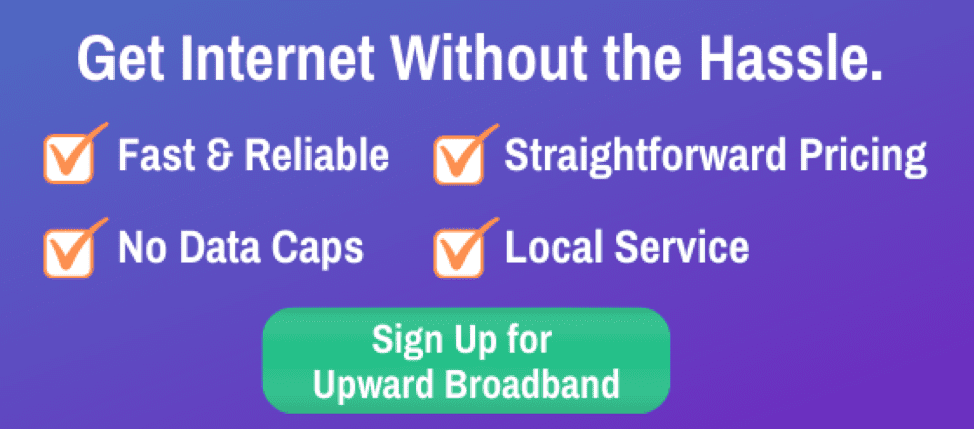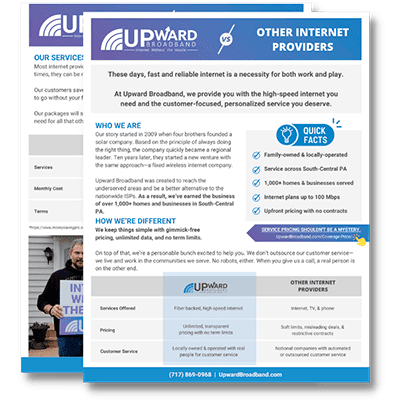When you open your monthly bill for internet service, is the “amount due” at the bottom more than the price that was advertised when you signed up?
Internet costs shouldn’t be confusing, and what you end up paying each month shouldn’t be a surprise. That’s why we’re sharing five ways that can help you pay less for your internet service.
Invest in Your Own Equipment
Most internet service providers rent modems and routers to their customers for a monthly fee. When you’re first signing up for internet service, this may seem like the easiest, quickest, and cheapest way to get connected.
While paying the fee for one month pales in comparison to investing in your own equipment, it can add up quickly, unnecessarily running up your monthly bill.
Many ISPs allow you to use your own equipment you purchase independently, and that can help save you money. Most routers are under $200. Depending on the rental fee, within a year or two the money you paid to rent the equipment could have been used to buy the equipment.
So when it comes down to it, if you have the money to lay out initially to purchase the equipment, you’ll likely save money in the long run. You’ll also be able to keep your equipment should you cancel your service and move on to a different ISP, as long as your equipment is compatible with your new ISP.
When purchasing, be sure you get equipment that’s approved by your ISP, or it may not work properly.
Reevaluate Your Speed Needs
Most ISPs offer different packages with varying internet speeds. The faster the connection, the more expensive the package.
If you’re looking to pay less for internet, one place to start is opting for slower service.
Before doing so, carefully consider whether or not your current online activities warrant a speed reduction. The more people and devices actively using your internet at once, the faster internet you’ll need. And certain activities take up more bandwidth than others. For example, if there are a few people in your home who want to stream TV and movies in HD or game online, you may run into frustrations without broadband-level speeds.
However, if it’s just you, you may be able to scale back your speeds while still doing all the activities you need to.
Here’s a helpful guide for selecting the correct internet speed.
Cut Down on Unnecessary Services or Bundle Your Service
Many ISPs allow you to bundle your internet, TV service, and phone. This can work for or against your budgeting goals.
If you want to keep all three services, you may be able to save money by taking advantage of these bundling packages, especially if there is a good pricing promotion going on.
However, if you rarely use those other services, you could save more money by cutting them out altogether.
Many American homes have already cut their land-line telephone services in favor of their cell phones. And each year, more and more are also cutting their satellite or cable TV subscriptions. They’re replacing them with streaming services that provide them with on-demand content for a much lower monthly fee than traditional TV options.
If you want to cut down on your services, you may be better off with an ISP that offers internet services unbundled. Sometimes, bundled services end up pressuring you into signing up for services you don’t need just because they’re part of a promotion.
Keep an Eye Out for Hidden Fees
Did you sign up for what you thought was a great deal, only to find that amount due to be much higher?
Some of these fees may be unavoidable, like the initial installation fee or equipment rental fee. In these cases, as long as they’re reasonable and communicated upfront, they shouldn’t have too much of a long-term impact on your bill.
However, other fees may pop up on itemized bills.
One of these is often referred to as the recovery fee. The amount will vary from ISP to ISP, but it is meant to cover the ISP’s maintenance and expansion. Surely we want our ISPs to keep their infrastructure running smoothly. But why hide this as an additional fee instead of including it in the price that’s promoted?
Another unexpected fee you can run into is a late payment fee. Depending on your ISP, this penalty may be either a set amount or a percentage of your bill. Either way, it’s extra money you’ll have to shell out in case you are a few days late. To help avoid this, see if you can switch to auto-pay so you never have to worry about forgetting.
Don’t Exceed Your Data Allotment and Pay Overage Fees
Americans use the internet more and more, placing a heavier burden on ISPs. As a response, some companies have set data limits. If you use more than your monthly data allotment, you’ll be penalized with an overage fee.
Some ISPs may advertise that they don’t have hard data limits, but they actually do. This can mean that instead of paying a fee once you exceed your monthly allotment, they’ll instead throttle your service and slow down your access. However, there are some ISPs out there that do not charge extra or throttle.
As many of us spend more time at home these days working and relaxing, our data usage is higher than it’s ever been. Exceeding your monthly service limits can quickly add up, so be sure to look at your contract to see what your limits are, keep an eye on your usage, or switch to an ISP that truly has no data limits.
Get Unlimited, Reliable Internet with Transparent Pricing
At Upward Broadband, we believe in providing transparent, gimmick-free pricing. All the charges that can end up on your bill before you sign up are on our pricing page, and we’ll communicate all of these to you before you sign up.
Our internet service comes unbundled, meaning you’ll only have to pay for what you need, and all of our plans offer unlimited internet with no throttling or overage charges*.
*Does not include Excess Utilization of Network Resources as defined by our Acceptable Use Policy.





